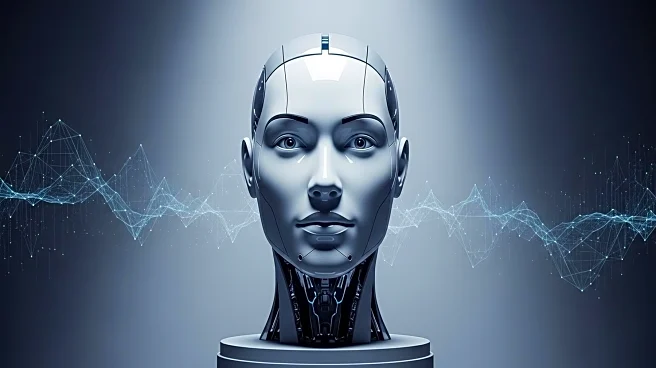What's Happening?
Hollywood is facing backlash over the emergence of Tilly Norwood, an AI-generated 'actor' created by Dutch comedian Eline Van der Velden. Norwood, designed to resemble a young actress, has sparked outrage among Hollywood celebrities and the Screen Actors Guild-American Federation of Television and Radio Artists (SAG-AFTRA). The union and several A-list stars, including Emily Blunt and Natasha Lyonne, have criticized the AI creation, arguing it lacks the emotional depth and life experience of human actors. Van der Velden aims to position Norwood as a leading figure in the industry, akin to Scarlett Johansson. Despite the controversy, Norwood's creators maintain that the AI actor is a creative work rather than a replacement for human performers.
Why It's Important?
The introduction of AI actors like Tilly Norwood raises significant concerns about the future of human artistry in Hollywood. SAG-AFTRA warns that using AI performers could undermine contractual protections secured after the 2023 Hollywood strikes, potentially jeopardizing actor livelihoods. The union emphasizes the importance of human-centered creativity, arguing that AI-generated content lacks the emotional connection audiences seek. The backlash highlights broader industry fears about AI's impact on employment and the devaluation of human performance. As AI technology advances, the entertainment industry faces ethical and economic challenges in balancing innovation with preserving traditional artistic roles.
What's Next?
The controversy surrounding Tilly Norwood is likely to intensify as talent agencies consider representing the AI actor. SAG-AFTRA has cautioned producers against using synthetic performers without adhering to contractual obligations, which require notice and bargaining. The union's stance suggests potential legal and industry-wide repercussions for agencies and studios engaging with AI actors. As discussions continue, Hollywood may see increased advocacy for regulations governing AI use in entertainment. The debate could influence future negotiations between unions and studios, shaping policies that protect human performers while accommodating technological advancements.
Beyond the Headlines
The emergence of AI actors like Tilly Norwood prompts deeper ethical questions about identity and creativity. Critics argue that AI creations, trained on the work of real performers, may constitute identity theft, raising concerns about consent and compensation. The situation underscores the need for clear guidelines on AI's role in creative industries, balancing innovation with respect for human contributions. As AI technology evolves, the entertainment sector must navigate complex cultural and legal dimensions, ensuring that technological progress does not compromise the integrity of artistic expression.









